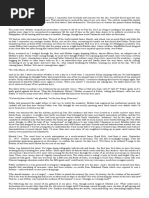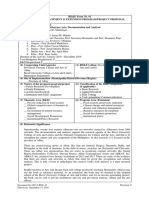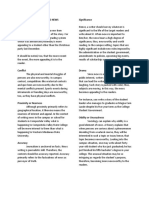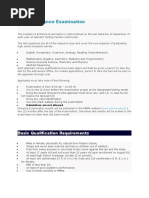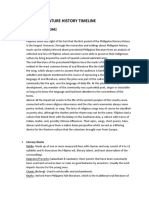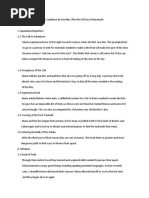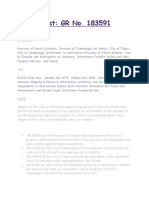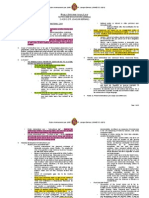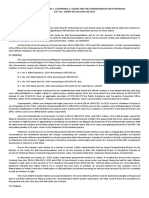Moa Ad
Moa Ad
Uploaded by
Jech TiuCopyright:
Available Formats
Moa Ad
Moa Ad
Uploaded by
Jech TiuOriginal Title
Copyright
Available Formats
Share this document
Did you find this document useful?
Is this content inappropriate?
Copyright:
Available Formats
Moa Ad
Moa Ad
Uploaded by
Jech TiuCopyright:
Available Formats
(MOA-AD) The Province of North Cotabato v.
The Government of the Republic of the Philippines Peace Panel on Ancestral Domain In 2008, the Government and the MILF, through the Chairpersons of their respective peace negotiating panels, were scheduled to sign a Memorandum of Agreement on the Ancestral Domain aspect of the Government-MILF TRIPOLI AGREMEENT ON PEACE OF 2001 IN MALAYSIA. The signing of the MOA-AD did not materialize because upon the motion of petitioners, the court issued a TRO enjoining the two parties from signing the same. The negotiations for the MOA-AD began in 1996, when the Government-MILF PEACE NEGOTIATIONS began. The MOA-AD contained, among others: The commitment of the Government and the MILF to pursue peace negotiations Protect and respect human rights Negotiate w/ sincerity in the settlement of conflict Refrain from the use of threat or force to attain undue advantage while the peace negotiations are ongoing However, in early 2000, the MILF attacked a number of municipalities in Central Mindanao, as well as take control of the town hall of Kauswagan, Lanao del Norte. Then President Estrada declared an all-out war against the MILF. When GMA assumed office, she sought a resumption of the peace talks. GMA asked the Malaysian Government through Prime Minister Mohammad to help convince the MILF to return to the negotiating table. The parties then met in Kuala Lumpur in 2001 and the talks were facilitated by the Malaysian Government. The parties also signed the Agreement on the General Framework for the Resumption of Peace talks and thereafter, the MILF suspended all its military actions. Formal peace talks were held in Tripoli, Libya from 20-22 June 2001. The outcome of which was the Government-MILF Tripoli AGREEMENT ON PEACE. The Agreement contained the basic principles and agenda of the negotiation: Security Aspect Rehabilitation Aspect Ancestral Domain Aspect The IRR on the Security Aspect was signed in Malaysia in August 2001. The IRR on the Rehabilitation Asect was sign in May 2002, also in Malaysia. Whereas the MOA-AD was set to be signed in August 2008, but as mentioned, the Court issued a TRO. The Province of North Cotabato filed a case against the signing of the MOA-AD, invoking their right to information on matters of public concern, as provided for by the Bill of Rights. They asked for the disclosure of the complete and official
copies of the MOA-AD, including its attachments. They also want the Court to declare the MOA-AD as unconstitutional. The City of Zamboanga also had the same contentions, with the special prayer that they be excluded from the Bangsamoro Homeland. The City of Iligan and the Province of Zamboanga del Norte also assailed the constitutionality of the MOAAD. The SC first reviewed the MOA-AD. The main body is divided into four sections CONCEPTS AND PRINCIPLES, TERRITORY, RESOURCES, AND GOVERNANCE. Under CONCEPTS AND PRINCIPLES, the Bangsamoro people are defined as the natives or original inhabitants of Mindanao and its adjacent islands including Palawan and Sulu at the time of colonization. Bangsamoro people also covers their descendants, whether mixed or full blood, and their spouses. The Bangsamoro Homeland is referred to as one where the ownership of which is vested exclusively in the Bangsamoro people by virtue of their prior rights of occupation. Both the Government and MILF acknowledged that ancestral domain does not form part of the public domain. The Bangsamoro people are also acknowledged to have the right of selfgovernance. Last but not least, the Bangsamoro Judicial Entity is granted the authority and jurisdiction over the ancestral domain and ancestral lands of the Bangsamoro. Under TERRITORY, the BJE is defined as the present geographic area of the ARMM, as well the certain municipalities of Lanao del Norte that voted for inclusion in the ARMM in the 2001 plebiscite. It is also stipulated that the BJE shall have jurisdiction over all natural resources within its internal waters. The BJE shall also have territorial waters, where the BJE and the Government shall exercise joint jurisdiction over all natural resources. The MOA-AD further provides for the sharing of minerals in the territorial waters between the Government and the BJE. Under RESOURCES, the BJE may enter into economic cooperation and trade relation with foreign countries. Aside from that, the sharing between the Government and the BJE of total production pertaining to natural resources is 75-25 in favor of the BJE. Moreover, the BJE may modify/cancel forest concessions, timber licenses, contracts or agreements granted by the Government, including those issued to the present ARMM. As for GOVERNANCE, the BJE is granted, among others, the power to build, develop, maintain its own institutions of civil service, electoral, financial and banking. It may also legislate and have its own judicial system.
The Court then stated that jurisprudence has upheld the right to access of public documents. There can be no realistic perception by the public of the nation's problems, nor a meaningful democratic decision-making if they are denied access to information of general interest. Then the Court ruled that the MOA-AD is a matter of public concern. The MOAAD undoubtedly involves the sovereignty and territorial integrity of the State, which directly affects the lives of the public at large.
You might also like
- International Commercial ArbitrationDocument46 pagesInternational Commercial ArbitrationJech Tiu0% (1)
- Petition For Writ of Habeas CorpusDocument5 pagesPetition For Writ of Habeas CorpusDiana CalangiNo ratings yet
- Basic OR Article 2 - Section 1 To 3Document24 pagesBasic OR Article 2 - Section 1 To 3Jean MojadoNo ratings yet
- 21st Century WS2Document7 pages21st Century WS2Ryan OrdinanteNo ratings yet
- Student Guidelines The School PoliciesDocument5 pagesStudent Guidelines The School PoliciesMaritessNo ratings yet
- Livelihoods of The Talaandig People in PurtulinDocument12 pagesLivelihoods of The Talaandig People in PurtulinGee LeeNo ratings yet
- Chapter1 Orientation To The NSTP-CWT - StudentDocument25 pagesChapter1 Orientation To The NSTP-CWT - StudentNicolaNo ratings yet
- 2B1 - Expression of Intent For Incoming Freshman Admission - 034018 PDFDocument4 pages2B1 - Expression of Intent For Incoming Freshman Admission - 034018 PDFSassy BulanNo ratings yet
- Pe 03 - Course ModuleDocument42 pagesPe 03 - Course ModuleMARIEL ASINo ratings yet
- Oblanca, Gwyneth T. Ms. Grace LucasDocument3 pagesOblanca, Gwyneth T. Ms. Grace LucasAvianna DiazNo ratings yet
- Contempora Ry Arts: Film: American PeriodDocument44 pagesContempora Ry Arts: Film: American PeriodAllyza JaneNo ratings yet
- Oro, Plata, Mata (GOLD, Silver, Death) 1982: Written By: José Javier ReyesDocument18 pagesOro, Plata, Mata (GOLD, Silver, Death) 1982: Written By: José Javier ReyesRed Acebuque PulaNo ratings yet
- Lesson 1-Ethics and It'S Key Concept: The Principles of Ethical Behavior in Modern Society by Jens Micah deDocument17 pagesLesson 1-Ethics and It'S Key Concept: The Principles of Ethical Behavior in Modern Society by Jens Micah deRose Marie BalmoresNo ratings yet
- Chief Sekoto SummaryDocument1 pageChief Sekoto SummaryMary Elizabeth SistosoNo ratings yet
- The Execution.1Document7 pagesThe Execution.1Gerry Mae O. DiazNo ratings yet
- Reflection Paper 1Document2 pagesReflection Paper 1Colleen Dejan100% (1)
- Telesforo Sungkit JR: by - 1 March 2018Document2 pagesTelesforo Sungkit JR: by - 1 March 2018RICO TACHADONo ratings yet
- CPC ScriptDocument4 pagesCPC ScriptTrisNo ratings yet
- Humms 12A Entrepreneurship - Strategic Planning and Business DevelopmentDocument7 pagesHumms 12A Entrepreneurship - Strategic Planning and Business DevelopmentChristian RiveraNo ratings yet
- 21st Century Albayano Arts 1Document6 pages21st Century Albayano Arts 1Richard MadrilejosNo ratings yet
- Champoon: Learning Resources For GE-Elect 1 (Asian Literature)Document14 pagesChampoon: Learning Resources For GE-Elect 1 (Asian Literature)SHEAN GAYLE ANG100% (1)
- Part 2 Examinations in Assessment of LearningDocument5 pagesPart 2 Examinations in Assessment of LearningshaneNo ratings yet
- Relevance of The Ibalong Epic To The BicolanosDocument1 pageRelevance of The Ibalong Epic To The BicolanosChin100% (1)
- Safety Protocols and Minimum Health StandardsDocument7 pagesSafety Protocols and Minimum Health StandardspaulazapantaNo ratings yet
- Valedictory Speech of Gwyneth Marie VasquezDocument3 pagesValedictory Speech of Gwyneth Marie VasquezKae Jin YoungNo ratings yet
- The TeacherDocument71 pagesThe TeacherMicheleNo ratings yet
- The Institution of The JuramentadoDocument5 pagesThe Institution of The JuramentadoHarvie Kenneth MAGPULONGNo ratings yet
- Land Pollution in The PhilippinesDocument2 pagesLand Pollution in The PhilippinesMelanie Christine Soriano Pascua50% (2)
- Philippine English 1.3 1Document16 pagesPhilippine English 1.3 1U M UNo ratings yet
- Work Sheet-7 Newtons 3laws Work SheetDocument11 pagesWork Sheet-7 Newtons 3laws Work SheetAndy MontesNo ratings yet
- Form D - Certification of Good Health: 2022 Dost-Sei Science and Technology Undergraduate Scholarships Application FormDocument1 pageForm D - Certification of Good Health: 2022 Dost-Sei Science and Technology Undergraduate Scholarships Application FormJinelle LaurenNo ratings yet
- Elements OF A GOOD NEWSDocument2 pagesElements OF A GOOD NEWSLois Jade TaranNo ratings yet
- National ArtistDocument14 pagesNational ArtistJohn JonasNo ratings yet
- Bawalan, Zyrine Faith L. PECRIM3 ReflectionDocument1 pageBawalan, Zyrine Faith L. PECRIM3 ReflectionEngland Israel SevidalNo ratings yet
- PMMA Entrance Examination: Basic Qualification RequirementsDocument1 pagePMMA Entrance Examination: Basic Qualification RequirementsRheu Reyes0% (1)
- Effects of Code SwitchingDocument46 pagesEffects of Code SwitchingReycel IlawanNo ratings yet
- National Library of The Philippines: (Please Read Instructions Carefully Before Filling Blanks)Document2 pagesNational Library of The Philippines: (Please Read Instructions Carefully Before Filling Blanks)Izzabel Cruz LasalaNo ratings yet
- ConyoDocument6 pagesConyoGabrielNo ratings yet
- What Is A Mole?: Calculate How Many Molecules Are in 5.5 Moles of Glucose (C H O) ?Document5 pagesWhat Is A Mole?: Calculate How Many Molecules Are in 5.5 Moles of Glucose (C H O) ?Bea Dacillo BautistaNo ratings yet
- Narrative ReportDocument1 pageNarrative Report4evernice :)No ratings yet
- Purposive Communication: Linear PerspectiveDocument2 pagesPurposive Communication: Linear PerspectiveGellian ElicanaNo ratings yet
- Against The Dying of The LightDocument15 pagesAgainst The Dying of The LightRudy Pascual AquinoNo ratings yet
- World Literature ExamDocument2 pagesWorld Literature ExamJin Velasquez100% (1)
- Angle of Repose and Uniform SlipDocument15 pagesAngle of Repose and Uniform SlipDavid Lancelot PiadNo ratings yet
- Title: THE LITTLE PEOPLE by Maria Aleah G. Taboclaon CharactersDocument2 pagesTitle: THE LITTLE PEOPLE by Maria Aleah G. Taboclaon CharactersMark Julius Maglunog CasalNo ratings yet
- The Literature of The New SocietyDocument2 pagesThe Literature of The New SocietyAngelo BaguioNo ratings yet
- TCW Part 1 Midterm 2nd - Sem.2021!22!2Document71 pagesTCW Part 1 Midterm 2nd - Sem.2021!22!2John Michael MendezNo ratings yet
- Gen Antonio LunaDocument4 pagesGen Antonio LunaGeroldo 'Rollie' L. Querijero100% (1)
- 1 Writing in The Discipline PLUS RevisedDocument51 pages1 Writing in The Discipline PLUS RevisedMonaifah SultanNo ratings yet
- Juan Tamad and The FleaDocument7 pagesJuan Tamad and The Flealou garcia100% (2)
- Survival - in History. You Need To Survive in Order To WinDocument3 pagesSurvival - in History. You Need To Survive in Order To WinFrany IlardeNo ratings yet
- Socio-Economic Impact of Business Establishments in Balagtas, Batangas City To The Community: Inputs To Business Plan DevelopmentDocument8 pagesSocio-Economic Impact of Business Establishments in Balagtas, Batangas City To The Community: Inputs To Business Plan DevelopmentAsia Pacific Journal of Multidisciplinary ResearchNo ratings yet
- Philippine Literature History Timeline: Historical EventsDocument11 pagesPhilippine Literature History Timeline: Historical EventsRedenRosuenaGabrielNo ratings yet
- College of Arts and Sciences: History of The English LanguageDocument11 pagesCollege of Arts and Sciences: History of The English LanguageKristine GaliciaNo ratings yet
- Poem Analysis ManofearthDocument2 pagesPoem Analysis ManofearthMichael Ryan EreseNo ratings yet
- History of BinalonanDocument4 pagesHistory of BinalonanJedidiah Joy PalmaNo ratings yet
- Early Trade ContactsDocument10 pagesEarly Trade ContactsJess JasminNo ratings yet
- Kite of StarsDocument2 pagesKite of StarsGray Amiel Vilar100% (3)
- Province of North Cotabato G.R. No. 183591 CaseDocument60 pagesProvince of North Cotabato G.R. No. 183591 CaseQuezon Mps IsabelaNo ratings yet
- Case Digest GR 183591Document9 pagesCase Digest GR 183591Maria Salmiyah Cruz Cruz100% (1)
- CONSTI Case DigestDocument58 pagesCONSTI Case DigestRose Ann VeloriaNo ratings yet
- Case Digest - GR No. 183591 - Attorney MorenaDocument12 pagesCase Digest - GR No. 183591 - Attorney Morenajedcee21No ratings yet
- Jurisdiction Criminal ProcedureDocument31 pagesJurisdiction Criminal ProcedureJech TiuNo ratings yet
- Constitutional Law Reviewer Jech TiuDocument52 pagesConstitutional Law Reviewer Jech TiuJech TiuNo ratings yet
- Jurisdiction ReviewerDocument5 pagesJurisdiction ReviewerJech TiuNo ratings yet
- Jurisdiction ReviewerDocument5 pagesJurisdiction ReviewerJech TiuNo ratings yet
- Obligations and Contracts Dean Del Castillo NotesDocument57 pagesObligations and Contracts Dean Del Castillo NotesJech Tiu100% (2)
- Evidence Digests 1 PDFDocument136 pagesEvidence Digests 1 PDFJech Tiu100% (1)
- CPUC DecisionDocument76 pagesCPUC DecisionJech TiuNo ratings yet
- PSB v. Lantin Extra DoctrineDocument1 pagePSB v. Lantin Extra DoctrineJech TiuNo ratings yet
- Ublic Nternational AW: Notes AND Discussions (2009) 2-A 2012 (FR. Joaquin Bernas)Document42 pagesUblic Nternational AW: Notes AND Discussions (2009) 2-A 2012 (FR. Joaquin Bernas)Jech TiuNo ratings yet
- Tan v. Del Rosario G.R. No. 109289 October 3, 1994: Vitug, J.: FactsDocument2 pagesTan v. Del Rosario G.R. No. 109289 October 3, 1994: Vitug, J.: FactsNinya SaquilabonNo ratings yet
- Constitution of India, Law and Engineering-Knc-601Document2 pagesConstitution of India, Law and Engineering-Knc-601bittu4554gnNo ratings yet
- New Microsoft Word Document JurisprudenceDocument3 pagesNew Microsoft Word Document JurisprudenceSinghNo ratings yet
- Exhibits 26 Pages Hunter Biden October GoodDocument26 pagesExhibits 26 Pages Hunter Biden October GoodabateventsNo ratings yet
- Federal Tort Claims ActDocument12 pagesFederal Tort Claims ActDevaughn Immanuel Corrica-El100% (1)
- Tennessee Executive Order 64Document4 pagesTennessee Executive Order 64NewsChannel 9 StaffNo ratings yet
- Activity Design SSG 2019Document4 pagesActivity Design SSG 2019Sonia Jovelyn Sab-it100% (4)
- Consti2Digest - ACCFA Vs CUGCO, G.R. No. L-21484 (29 Nov 1969)Document1 pageConsti2Digest - ACCFA Vs CUGCO, G.R. No. L-21484 (29 Nov 1969)Lu CasNo ratings yet
- Bail People Vs Valdez FCDocument5 pagesBail People Vs Valdez FCCayen Cervancia CabiguenNo ratings yet
- Letter From Richard Coudenhove-Kalergi To Winston Churchill (19 December 1947)Document2 pagesLetter From Richard Coudenhove-Kalergi To Winston Churchill (19 December 1947)Anonymous HtDbszqtNo ratings yet
- Govt of US Vs Judge ParugananDocument10 pagesGovt of US Vs Judge ParugananroigtcNo ratings yet
- CSC vs. Dacoycoy 366 Phil 86Document1 pageCSC vs. Dacoycoy 366 Phil 86Alexis Von TeNo ratings yet
- Final Summative Assessment: Instruction: Answer The Following QuestionsDocument3 pagesFinal Summative Assessment: Instruction: Answer The Following QuestionsArgefe JuegosNo ratings yet
- De XXX - 2020.10.28 Verified ComplaintDocument33 pagesDe XXX - 2020.10.28 Verified ComplaintDavid LublinNo ratings yet
- Lutfur Rahman Judgment - Spiritual InfluenceDocument17 pagesLutfur Rahman Judgment - Spiritual InfluenceThe GuardianNo ratings yet
- The Separation of Powers in The USDocument4 pagesThe Separation of Powers in The USoshantoridoyNo ratings yet
- G.R. No. 134298.PDF Tan Vs PeopleDocument5 pagesG.R. No. 134298.PDF Tan Vs PeopleAronJamesNo ratings yet
- Formation of MalaysiaDocument11 pagesFormation of MalaysiaCruise_IceNo ratings yet
- Atlantic CommunityDocument31 pagesAtlantic CommunityCristinaDogotNo ratings yet
- Israaid: The Israel Forum For International Humanitarian AidDocument2 pagesIsraaid: The Israel Forum For International Humanitarian AidRicky Canico ArotNo ratings yet
- Venue Is An Essential Element of Jurisdiction in Criminal CasesDocument2 pagesVenue Is An Essential Element of Jurisdiction in Criminal CasesAnonymous geq9k8oQyONo ratings yet
- Political Science Grad Brochure 2023-24-0Document5 pagesPolitical Science Grad Brochure 2023-24-0ZainabNo ratings yet
- Ucsp ReportDocument11 pagesUcsp ReportGladys F. Bacolod100% (1)
- 15 PaduavRoblesDocument3 pages15 PaduavRoblesKCCNo ratings yet
- What Is EgalitarianismDocument36 pagesWhat Is EgalitarianismSeung Yoon Lee100% (1)
- 1st and 2nd NoticeDocument5 pages1st and 2nd NoticeKristiana Montenegro GelingNo ratings yet
- Teaching Profession and Social DimensionDocument8 pagesTeaching Profession and Social DimensionJulian ManaloNo ratings yet
- Sonubai Yeshwant Jadhav V Bala Govinda Yadav AIR 1983 Bom 156 Srinivasa Aiyar Vs Saraswathi Ammal, 1951 AIR 1952 Mad 193, (1951) 2 MLJ 649Document3 pagesSonubai Yeshwant Jadhav V Bala Govinda Yadav AIR 1983 Bom 156 Srinivasa Aiyar Vs Saraswathi Ammal, 1951 AIR 1952 Mad 193, (1951) 2 MLJ 649haydeeirNo ratings yet
- Coakley & Williams Construction, Inc., A.S.B.C.A. (2017)Document2 pagesCoakley & Williams Construction, Inc., A.S.B.C.A. (2017)Scribd Government DocsNo ratings yet














